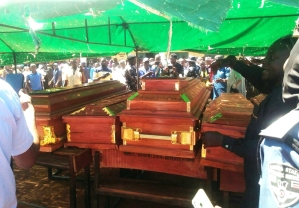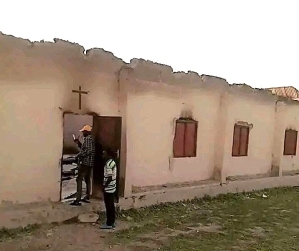
Seven Christians, including a 12-year-old boy, were mourned on Saturday (Nov. 8) after they were killed in an attack in Kaduna state, Nigeria, the same day Islamic extremists burned homes and a church building in Borno state.
At a funeral in Damakasuwa town, Kauru County in northwest Nigeria’s southern Kaduna state, hundreds of people including many from outside the area attended the service for the Christians slain on Oct. 31 by Fulani herdsmen and other terrorists, residents said.
“We have laid to rest seven of our beloved Christians who were killed by terrorists and Fulani herdsmen,” area resident Daniel Dodo told Christian Daily International-Morning Star News. “The funeral is a ceremony of tears being shed by Christians in the midst of deliberate violence against us because of our Christian faith.”
The funeral was held for Yohanna Adamu, 46; Bala Bude Chawai, 57; Yakubu Bala, 50; Abubakar Ya’u, 30; Ishaya Dauda, 56; Monday Nveneh, 46; and Savior Emmanuel, 12.
“This funeral has became a powerful display of unity, faith and shared resilience for Christians,” Dodo said. “Families wept, neighbors embraced and prayers filled the air as hundreds gathered to honor the Christian victims, innocent lives taken too soon, but never forgotten.”
The Rev. Madaki Sarki of the Evangelical Church Winning All (ECWA) told mourners that they were burying their loved ones but not their hope.
“Today we weep, but we also choose unity,” Pastor Sarki said. “The blood of the innocent must bind us together, to protect one another, to stand for peace, and to honor the memory of those we have lost.”
Area resident Rahila Chawaig said the Damakasuwa Christian community left the funeral with heavy hearts but also with a renewed sense of togetherness, determined that love and peace would triumph over fear and violence.
“As the last prayers were said and the graves covered, the sound of sobbing gave way to quiet determination,” Chawaig told Christian Daily International-Morning Star News.
Numbering in the millions across Nigeria and the Sahel, predominantly Muslim Fulani comprise hundreds of clans of many different lineages who do not hold extremist views, but some Fulani do adhere to radical Islamist ideology, the United Kingdom’s All-Party Parliamentary Group for International Freedom or Belief (APPG) noted in a 2020 report.
“They adopt a comparable strategy to Boko Haram and ISWAP and demonstrate a clear intent to target Christians and potent symbols of Christian identity,” the APPG report states.
Christian leaders in Nigeria have said they believe herdsmen attacks on Christian communities in Nigeria’s Middle Belt are inspired by their desire to forcefully take over Christians’ lands and impose Islam as desertification has made it difficult for them to sustain their herds.
In the country’s North-Central zone, where Christians are more common than they are in the North-East and North-West, Islamic extremist Fulani militia attack farming communities, killing many hundreds, Christians above all, according to the report. Jihadist groups such as Boko Haram and the splinter group Islamic State in West Africa Province (ISWAP), among others, are also active in the country’s northern states, where federal government control is scant and Christians and their communities continue to be the targets of raids, sexual violence, and roadblock killings, according to the report. Abductions for ransom have increased considerably in recent years.
Borno Burnings
Also on Saturday (Nov. 8), militants from Islamic extremist group Boko Haram attacked a Christian community in northeast Nigeria’s Borno state, burning down a church building, houses and other Christian-owned property in the Chibok area, sources said.
Residents said a Church of the Brethren in Nigeria (EYN) building was gutted by fire.

“Pemi community in Chibok Local Government Area of Borno state is currently under attack by Boko Haram terrorists,” resident Andrew Yohanna told Christian Daily International-Morning Star News over the weekend. “We need your prayers.”
Resident Peter Maina said the arson attack also claimed the EYN pastor’s house.
Josiah Ayuba Ponna, another resident, said area Christians were shocked and outraged by the Boko Haram attack on Pemi village in Chibok Local Government Area.
“The destruction of the EYN Church, shops and cars is a painful reminder of the insecurity in our community,” Ponna told Christian Daily International-Morning Star News. “This is not the first time our church has been attacked, and we're tired of living in fear. We demand action from our leaders; we need protection, security, and justice. We demand an end to this senseless violence.”
Resident Tabitha Joel pleaded for help from the Nigerian government.
“This violent attack has ravaged the community, leaving a trail of destruction, displacement, and unimaginable suffering,” Joel said. “The attackers not only targeted homes but also set ablaze cars, churches and shops, leaving the community in ruins. The images are heartbreaking, with burnt-out vehicles, destroyed places of worship, and businesses reduced to ashes.”
The Chibok area has suffered numerous attacks by Islamic extremists in recent years, including the kidnapping of 276 high school girls by Boko Haram in 2014, and she said Christians in Pemi and in other areas of Chibok are crying out for help.
“We are scared, vulnerable and in dire need of assistance. The attack has left many without homes, without families, and without hope,” Joel said. “We are living in fear, women are mourning the loss of loved ones and children are growing up without parents.”
Area resident Jacob Pindar said Christians were heartbroken by the latest attack.
“The destruction of the EYN Church, shops, and private vehicles is more than just property damage – it’s a painful reminder that our community remains under siege,” Pindar said. “This is not an isolated incident as our church has been attacked repeatedly. We are tired of living under the constant shadow of fear.
We are done with promises. We demand immediate, tangible action from our government to put a decisive end to this senseless violence now.”
Resident Markus Njidda said nearly every village in the Chibok area has been attacked in the past year, with Islamic extremists killing many Christians.
“In Pemi community, Boko Haram burned down churches and Christian houses; if this is not genocide, what else is it?” Njidda said.
Nigeria remained among the most dangerous places on earth for Christians, according to Open Doors’ 2025 World Watch List of the countries where it is most difficult to be a Christian. Of the 4,476 Christians killed for their faith worldwide during the reporting period, 3,100 (69 percent) were in Nigeria, according to the WWL.
“The measure of anti-Christian violence in the country is already at the maximum possible under World Watch List methodology,” the report stated.
The violence has spread to southern states, and a new jihadist terror group, Lakurawa, has emerged in the northwest, armed with advanced weaponry and a radical Islamist agenda, the WWL noted. Lakurawa is affiliated with the expansionist Al-Qaeda insurgency Jama’a Nusrat ul-Islam wa al-Muslimin, or JNIM, originating in Mali.
Nigeria ranked seventh on the 2025 WWL list of the 50 worst countries for Christians.





